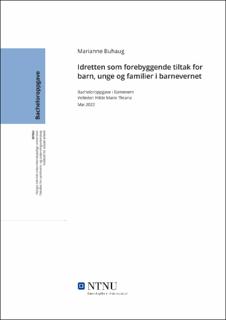Idretten som forebyggende tiltak for barn, unge og familier i barnevernet
Bachelor thesis
Permanent lenke
https://hdl.handle.net/11250/3000751Utgivelsesdato
2022Metadata
Vis full innførselSamlinger
- Institutt for sosialt arbeid [1381]
Sammendrag
Barnevernets hovedoppgave er å sikre at barn og unge som lever under forhold som kan skade deres helse og utvikling, får nødvendig hjelp og omsorg til rett tid, samt å bidra til at barn og unge får trygge oppvekstsvilkår. Det er den kommunale barneverntjenesten som innehar ansvaret for at barn og unge får den nødvendige hjelpen de trenger, herunder å også bedrive forebyggende arbeid. Flere studier har påvist negative konsekvenser for barn og unges psykologiske utvikling ved å vokse opp med dårlige levekår eller i en familie med lav sosioøkonomisk status. Barn og unge som har blitt utsatt for omsorgssvikt er særlig utsatt for nedsatt livskvalitet og fysiske og psykiske helseplager på kort og lang sikt, sammenlignet med barn uten slike erfaringer. Å arbeide forebyggende kan derfor sees på som en viktig metode i folkehelsearbeidet.
Denne oppgaven tar for seg hvorfor idrett bær være et forebyggende tiltak i barnevernet, og hvilken positiv innvirkning deltakelse i idretten kan ha på barn og unge som er utsatt for omsorgssvikt. Empirien viser at fysisk aktivitet og idrett kan påvirke barn, unge og familier i positiv retning. Barn, unge og familier i barnevernet viser ofte tegn til sosiale og psykiske utfordringer. Funnene i denne litteraturstudien tyder på at fysisk aktivitet nettopp spiller inn på disse faktorene. Deltakelse i idrett kan derfor være et relevant tiltak i barnevernets forebyggende arbeid, samt i arbeidet med barn og unge utsatt for omsorgssvikt. The child welfare service's main task is to ensure that children and young people living in conditions that can harm their health and development receive the necessary help and care at the right time, as well as to help ensure that children and young people have safe conditions for growing up. It is the municipal child welfare service that is responsible for ensuring that children and young people receive the necessary help they need, which also includes doing preventive work. Several studies have shown negative consequences for the psychological development of children and adolescents by growing up with poor living conditions or in a family with low socioeconomic status. Children and adolescents who have been exposed to neglect are particularly at risk of having reduced quality of life and physical and mental health problems in the short and long term, compared to children without such experiences. Working preventively can therefore be seen as an important method in public health work.
This task addresses why sports are a preventive measure in child welfare services, and what positive impact participation in sport can have on children and adolescents who are prone to neglect. The empirical data show that physical activity and sports can affect children, young people, and families in a positive way. Children, young people, and families in the child welfare service often show signs of social and psychological challenges. The findings of this literature study suggest that physical activity precisely plays a part in these factors. Participation in sports can therefore be a relevant measure in the child welfare service's preventive work, as well as in the work with children and young people prone to neglect.
